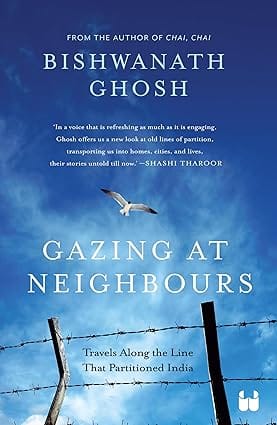WELCOME TO MIDLAND BOOK SHOP!
SHOP FOR
- Contemporary Fiction
- Contemporary Fiction
- Children
- Children
- Comics & Graphic Novels
- Comics & Graphic Novels
- Non-Fiction
- Non-Fiction
- Fiction
- Fiction
Shop No.20, Aurobindo Palace Market, Hauz Khas, Near Church +91 9818282497 | 011 26867121 110016 New Delhi IN
Midland The Book Shop ™
Shop No.20, Aurobindo Palace Market, Hauz Khas, Near Church +91 9818282497 | 011 26867121 New Delhi, IN
+919871604786 https://www.midlandbookshop.com/s/607fe93d7eafcac1f2c73ea4/676a925de6f825019b0470ed/instagram-post-3--480x480.jpeg" [email protected]9789360458980 6713a272939e09002b8bad1b Gazing At Neighbours Travels Along The Line That Partitioned India https://www.midlandbookshop.com/s/607fe93d7eafcac1f2c73ea4/6713a273939e09002b8bad23/71txbbvoayl-_sy425_.jpg 9789360458980
About the Book
AN INTERESTING TAKE AT THE PARTITION OF THE INDIAN SUBCONTINENT, THIS BOOK LOOKS AT THE PLACES DOTTING INDIA’S BORDERS WITH ITS NEIGHBOURS AND THE PEOPLE WHO LIVE THERE.
In July 1947, British barrister Cyril Radcliffe was summoned to New Delhi and given five weeks to draw, on the map of the subcontinent, two zigzagged lines that would decide the future of one-fifth of the human race.
One line, 553 kilometres long, created the province of West Punjab; the other, adding up to 4,096 kilometres, carved out a province called East Bengal. Both territories joined the newborn nation of Pakistan—an event called the Partition of India, which saw one million people being butchered and another fifteen million uprooted from their homes.
Enough and more has been written about the horrors of Partition, but what of the people who actually inhabit the land through which these lines run?
Curiosity leads Bishwanath Ghosh into journeying along the Radcliffe Line—through the vibrant greenery of Punjab as well as the more melancholic landscape of the states surrounding Bangladesh—and examining, first hand, life on the border. Recording his encounters and experiences in luminous prose, Gazing at Neighbours is a narrative of historical stock-taking as much as of travel.
About the Author
Bishwanath Ghosh, born in Kanpur on 26 December 1970, is the author of the hugely popular Chai, Chai: Travels in Places Where You Stop But Never Get Off. He’s also a Hindi poet, who has two well-received compilations—Jiyo Banaras and Tedhi-Medhi Lakeeren—to his credit. His other books include Tamarind City: Where Modern India Began; Longing, Belonging: An Outsider at Home in Calcutta and Gazing at Neighbours: Travels Along the Line that Partitioned India. He is an Associate Editor with The Hindu newspaper and lives in Calcutta.
AN INTERESTING TAKE AT THE PARTITION OF THE INDIAN SUBCONTINENT, THIS BOOK LOOKS AT THE PLACES DOTTING INDIA’S BORDERS WITH ITS NEIGHBOURS AND THE PEOPLE WHO LIVE THERE.
In July 1947, British barrister Cyril Radcliffe was summoned to New Delhi and given five weeks to draw, on the map of the subcontinent, two zigzagged lines that would decide the future of one-fifth of the human race.
One line, 553 kilometres long, created the province of West Punjab; the other, adding up to 4,096 kilometres, carved out a province called East Bengal. Both territories joined the newborn nation of Pakistan—an event called the Partition of India, which saw one million people being butchered and another fifteen million uprooted from their homes.
Enough and more has been written about the horrors of Partition, but what of the people who actually inhabit the land through which these lines run?
Curiosity leads Bishwanath Ghosh into journeying along the Radcliffe Line—through the vibrant greenery of Punjab as well as the more melancholic landscape of the states surrounding Bangladesh—and examining, first hand, life on the border. Recording his encounters and experiences in luminous prose, Gazing at Neighbours is a narrative of historical stock-taking as much as of travel.
About the Author
Bishwanath Ghosh, born in Kanpur on 26 December 1970, is the author of the hugely popular Chai, Chai: Travels in Places Where You Stop But Never Get Off. He’s also a Hindi poet, who has two well-received compilations—Jiyo Banaras and Tedhi-Medhi Lakeeren—to his credit. His other books include Tamarind City: Where Modern India Began; Longing, Belonging: An Outsider at Home in Calcutta and Gazing at Neighbours: Travels Along the Line that Partitioned India. He is an Associate Editor with The Hindu newspaper and lives in Calcutta.
Review
In a voice that is refreshing as much as it is engaging, Ghosh offers us a new look at old lines of Partition, transporting us into homes, cities and lives, their stories untold till now. — Shashi Tharoor
The book turns out to be refreshingly journalistic (and an excellent primer of good reportage), astutely observant and interspersed with well-written anecdotes, well-documented conversations and logically sound musings. — Manek S. Kohli,
The book turns out to be refreshingly journalistic (and an excellent primer of good reportage), astutely observant and interspersed with well-written anecdotes, well-documented conversations and logically sound musings. — Manek S. Kohli,
in stockINR 399
1 1
Email ID already exists!
Your Current password is incorrect
Password Updated Successfully
Thanks for your Feedback
Gazing At Neighbours Travels Along The Line That Partitioned India
ISBN: 9789360458980
₹399
₹499 (20% OFF)SIZE GUIDE
Sold By: Hauz Khas - Aurobindo Market
Details
- ISBN: 9789360458980
- Author: Bishwanath Ghosh
- Publisher: Westland Non Fiction
- Pages: 356
- Format: Paperback
Book Description
About the Book
AN INTERESTING TAKE AT THE PARTITION OF THE INDIAN SUBCONTINENT, THIS BOOK LOOKS AT THE PLACES DOTTING INDIA’S BORDERS WITH ITS NEIGHBOURS AND THE PEOPLE WHO LIVE THERE.
In July 1947, British barrister Cyril Radcliffe was summoned to New Delhi and given five weeks to draw, on the map of the subcontinent, two zigzagged lines that would decide the future of one-fifth of the human race.
One line, 553 kilometres long, created the province of West Punjab; the other, adding up to 4,096 kilometres, carved out a province called East Bengal. Both territories joined the newborn nation of Pakistan—an event called the Partition of India, which saw one million people being butchered and another fifteen million uprooted from their homes.
Enough and more has been written about the horrors of Partition, but what of the people who actually inhabit the land through which these lines run?
Curiosity leads Bishwanath Ghosh into journeying along the Radcliffe Line—through the vibrant greenery of Punjab as well as the more melancholic landscape of the states surrounding Bangladesh—and examining, first hand, life on the border. Recording his encounters and experiences in luminous prose, Gazing at Neighbours is a narrative of historical stock-taking as much as of travel.
About the Author
Bishwanath Ghosh, born in Kanpur on 26 December 1970, is the author of the hugely popular Chai, Chai: Travels in Places Where You Stop But Never Get Off. He’s also a Hindi poet, who has two well-received compilations—Jiyo Banaras and Tedhi-Medhi Lakeeren—to his credit. His other books include Tamarind City: Where Modern India Began; Longing, Belonging: An Outsider at Home in Calcutta and Gazing at Neighbours: Travels Along the Line that Partitioned India. He is an Associate Editor with The Hindu newspaper and lives in Calcutta.
AN INTERESTING TAKE AT THE PARTITION OF THE INDIAN SUBCONTINENT, THIS BOOK LOOKS AT THE PLACES DOTTING INDIA’S BORDERS WITH ITS NEIGHBOURS AND THE PEOPLE WHO LIVE THERE.
In July 1947, British barrister Cyril Radcliffe was summoned to New Delhi and given five weeks to draw, on the map of the subcontinent, two zigzagged lines that would decide the future of one-fifth of the human race.
One line, 553 kilometres long, created the province of West Punjab; the other, adding up to 4,096 kilometres, carved out a province called East Bengal. Both territories joined the newborn nation of Pakistan—an event called the Partition of India, which saw one million people being butchered and another fifteen million uprooted from their homes.
Enough and more has been written about the horrors of Partition, but what of the people who actually inhabit the land through which these lines run?
Curiosity leads Bishwanath Ghosh into journeying along the Radcliffe Line—through the vibrant greenery of Punjab as well as the more melancholic landscape of the states surrounding Bangladesh—and examining, first hand, life on the border. Recording his encounters and experiences in luminous prose, Gazing at Neighbours is a narrative of historical stock-taking as much as of travel.
About the Author
Bishwanath Ghosh, born in Kanpur on 26 December 1970, is the author of the hugely popular Chai, Chai: Travels in Places Where You Stop But Never Get Off. He’s also a Hindi poet, who has two well-received compilations—Jiyo Banaras and Tedhi-Medhi Lakeeren—to his credit. His other books include Tamarind City: Where Modern India Began; Longing, Belonging: An Outsider at Home in Calcutta and Gazing at Neighbours: Travels Along the Line that Partitioned India. He is an Associate Editor with The Hindu newspaper and lives in Calcutta.
Review
In a voice that is refreshing as much as it is engaging, Ghosh offers us a new look at old lines of Partition, transporting us into homes, cities and lives, their stories untold till now. — Shashi Tharoor
The book turns out to be refreshingly journalistic (and an excellent primer of good reportage), astutely observant and interspersed with well-written anecdotes, well-documented conversations and logically sound musings. — Manek S. Kohli,
The book turns out to be refreshingly journalistic (and an excellent primer of good reportage), astutely observant and interspersed with well-written anecdotes, well-documented conversations and logically sound musings. — Manek S. Kohli,
User reviews
NEWSLETTER
Subscribe to get Email Updates!
Thanks for subscribing.
Your response has been recorded.

India's Iconic & Independent Book Store offering a vast selection of books across a variety of genres Since 1978.
"We Believe In The Power of Books" Our mission is to make books accessible to everyone, and to cultivate a culture of reading and learning. We strive to provide a wide range of books, from classic literature, sci-fi and fantasy, to graphic novels, biographies and self-help books, so that everyone can find something to read.
Whether you’re looking for your next great read, a gift for someone special, or just browsing, Midland is here to make your book-buying experience easy and enjoyable.
We are shipping pan India and across the world.
For Bulk Order / Corporate Gifting
 +91 9818282497 |
+91 9818282497 |  [email protected]
[email protected]
Click To Know More
INFORMATION
ACCOUNT
QUICK LINKS
ADDRESS
Midland Book Shop - Hauz Khas
Shop No.20, Aurobindo Palace Market, Near Church, New Delhi
Shop No.20, Aurobindo Palace Market, Near Church, New Delhi














